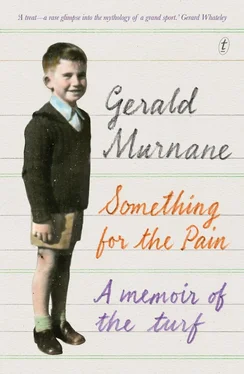Had I not learned from those black-and-white newsreels mentioned earlier how fast a field of racehorses travelled? Seemingly not. Perhaps I assumed the image-horses in the newsreels had been speeded up like the image-persons in old silent films. Or, perhaps I forgot my brief sight of the Melbourne Cup field during the year that followed, when I would have spent hour after hour moving my glass-marble racehorses around the lounge-room mat so that a race could be prolonged for hours or even days.
I surely learned much on that first day at Mornington, although there were surely also a number of things that turned out to be just as I had expected them — the racing colours, for example, or the bookmakers’ odds and the betting. I learned each of my two most memorable lessons from a particular horse. One was the actual mare Targie and the other was the imaginary mare Ladies’ Pants.
Targie (Light blue, burgundy stripe and cap) ran in the last race of the day. I’ve forgotten her trainer, but her rider was Kevin Mitchell, who seldom attracted publicity but was an outstanding jockey for many years. Targie was second- or third-favourite in the race. The favourite was Great Caesar (Green, gold star — or was it a diamond?). Mitchell kept Targie just behind the leader until they entered the short, uphill Mornington straight. The rider of Great Caesar had kept his mount midfield and wide for most of the way. While Targie was about to pass the leader, Great Caesar was circling the field with a strong run.
As I prepare to write the forthcoming paragraphs, I’m reminded of the many debates, during the history of Christianity, on the subject of free will and predestination. I was once able to make myself slightly dizzy by trying to reconcile the opposing views, as I understood them. Sometimes, it seemed to me that if God was all-knowing and if He foresaw all of human history, then human beings were incapable of making free choices; all they could do was to follow whatever course of action was already mapped out for them. But sometimes, I could convince myself that human beings were indeed free. At any moment, a person was able to decide between several possible courses of action and so to alter his or her future. In this scheme of things, however, God seemed reduced in stature. How could He be all-knowing and all-powerful, if human beings — His mere creatures — were making up history as they went?
The above may seem far removed from horse racing, and yet I’ve observed myself over the years changing from someone whose view of racing was that of a predestinarian to someone who stands on the side of free will. Probably because I saw no actual races until I was nearly fifteen, I tended as a boy to think of each race as predestined. When I looked through a field of horses of a Saturday morning, I felt as though I was merely trying to see in mind the results of the race as they were going to be printed in the Saturday evening edition of the Sporting Globe . I might seem to myself sometimes to be weighing up the claims of various horses, but God or Destiny had done this already, and the race would be run so that the preordained winner actually won. This was the sort of thinking, by the way, that drove many punters to search for the perfect betting system. The researcher of systems, having found, let us say, that horses carrying top weight and starting favourite won twenty-five per cent of the races they contested in a given year, would assume that such horses would register exactly the same achievement in any later year.
I hadn’t been a regular racegoer for long before I came to understand that no race result should be thought of as inevitable; that the best a punter can do is to pick a horse that seems to have a winning chance and to hope that the horse has good luck in running. Even if the Almighty, in the vast Grandstand in the Sky, knows all the winners in advance, He knows too that in many a race an eventual second-placegetter was being hailed as the winner twenty metres short of the post.
I don’t remember whether I had tried to select the winner of the last race at Mornington on that day in 1953. I would have been still a predestinarian, and if I had selected Targie I would have supposed, a few seconds after the field had straightened, that I had correctly worked out what God had known through all eternity. Kevin Mitchell had driven the mare to the front. None of those immediately behind her was making any ground. She seemed safe. Kevin Mitchell, though, seemed not to share my theological views, or perhaps he knew what a strong finisher was Great Caesar. Mitchell took to Targie with the whip — not flogging her but keeping her mind on the job, as one racecourse expression would have put the matter, or making a good thing of her, to use another such expression. And well he might have whipped the mare, for Great Caesar — whose rider had sat quietly rounding the turn, perhaps to let the horse keep its balance — was now finishing fast.
This was only my first day at the races, but I could see that Great Caesar would beat Targie, even when he was still a length or two behind the mare. The favourite drew level twenty or thirty metres out and quickly passed Targie. And then, still three or four strides short of the winning post, Kevin Mitchell put away his whip. I must have been watching him intently, for I can call his actions to mind with absolute clarity and have done so many times during the last sixty years. Mitchell looked across at the colours on the jockey just then passing him. Then, with a surprisingly graceful gesture, he changed his grip on the handle of his whip so that it rested near the mare’s shoulder while he rode her with hands and heels towards the post. Whether he was a believer in predestination or whether he argued for the operation of free will, his graceful gesture seemed his way of saying that he had done all in his power and could do no more.
A few hours before I had learned from Targie to question some of my beliefs about racing, I had been offered a lesson in quite a different field of knowledge. I used the word offered advisedly. The lesson took place, but I doubt whether I learned much from it. Or, rather, I doubt whether I’ve profited much during my lifetime from whatever I learned that day at the Mornington races.
A good-sized crowd was on course. On the grassy slope overlooking the winning post, people stood shoulder to shoulder before each race. I watched most races alone. My father and Len Luxford liked to stay in the betting ring until the last few minutes, whereas I liked to have a good view of the races. Before one of the main races, the persons nearest to me on my right side were two or three young women. I have no recollection whatever of the appearance of the young women or of what they would have been talking about in my hearing. I was a gangling boy of nearly fifteen. Even if the persons beside me had seemed only three or four years older than I, I would have thought of them as mature women and of myself as a mere boy. Even if they had seemed to be of my own age, I might not have met their eyes. I had not even spoken to any female of my own age for two years.
In 1951, I’d had a girlfriend for most of the year. We were only twelve years old, she flat-chested and I still in short pants, but we were comfortable together. By early 1952, my family had moved to the opposite side of Melbourne and I was attending an all-boys school. We lived in a suburb of mostly new houses occupied by couples with infant children. I don’t recall even passing any girl of my own age in the streets of my suburb.
Not long before the start of the main race, a young man positioned himself just in front of me. He may have been one of a group of two or three — I don’t remember. He seemed to be of about the same age as the young women and, although they were obviously strangers to him, he set about getting their attention. His chief target was the young woman nearest him, who was also the one nearest me. I was embarrassed and kept my eyes on the horses milling behind the barrier, which was not far away at the top of the straight.
Читать дальше












